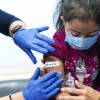Epidemiologists and pediatricians in Massachusetts say COVID-19 vaccines have been shown to be safe and effective for children under the age of 5, and they're urging parents to bring little ones in for a shot as soon as they're available.
On Wednesday, a Food and Drug Administration advisory panel recommended vaccines for children as young as 6 months old. The FDA and Centers for Disease Control and Prevention could follow suit and authorize vaccines for young children before the end of the weekend. Pediatricians in Massachusetts have been told they could have vaccines on hand as soon as Monday.
"The most important thing is to know that this vaccine is absolutely safe," said Dr. Lloyd Fisher, a Worcester pediatrician and president of the Massachusetts chapter of the American Academy of Pediatrics. "What we saw in the trials was that the side effects that children of this age had to this vaccine were typical of the side effects that older children and adults also have to this vaccine."
More Local News
Clinical trials also showed the Moderna and Pfizer vaccines are effective in the youngest age group, even though some of the data doesn't appear as impressive as the initial trials in adults.
"The earlier studies in the older age groups was done pre-omicron," Fisher explained. "So we saw a much better efficacy against all infection. So what we really care about — what's most important — is how does this vaccine do against severe infection, hospitalizations and death?"
That was hard to study, Fisher said, because the incidence of hospitalization and death is very low in young kids. But clinical trials showed antibody levels in children under 5 that are comparable to older kids, so the protection is believed to be the same.
He said the rollout in Massachusetts will involve pharmacies, doctors' offices and mobile clinics, which the state plans to use in 20 communities considered high-risk. Pharmacies will likely have vaccines available for children ages 3 to 5, but, Fisher said, younger children would be best served by people who are used to giving shots to infants and toddlers.
"The best place or the most comforting place to most parents is going to be in their pediatrician or family physician's office," he said.
Pediatric practices in the state were given the opportunity over the last two weeks to preorder vaccines — before being authorized for the youngest age group — to allow pediatricians to begin vaccinations as soon as possible. Fisher said many practices took advantage of the opportunity.
According to the state, there are about 320,000 Massachusetts children who will become eligible for the vaccine once the final approval is granted.
Even though young children are unlikely to become seriously ill if they get COVID-19, Dr. Daniel Rauch, chief of pediatric hospital medicine at Tufts Children’s Hospital, urged parents to take them to the doctor for a shot.
"You get vaccinated to protect the community around you," Rauch said. "And so you may be relatively safe, or feel safe, that your child's going to come to no harm if they get COVID. But is that going to be true for grandma and grandpa and [your] cousin who's getting cancer treatment and your other cousin or aunt or uncle who is on immunosuppressive drugs for whatever their illness is? And do you really want your own child to bring COVID home and spread it in the household to other people?"
The safety evaluation of the vaccines has been thorough, Rauch said.
"We've got almost two years experience with the vaccine as a whole," he said."We're confident in the process. We're confident in the quality of the vaccine makers, that they're churning out a product that's safe. And we're now years into into children and teenagers and adults getting this vaccine. And the safety profile has been unbelievable."
Even so, vaccination rates in Massachusetts for older children is far below rates for adults. As of last week, the state reported 58% of kids aged 5-11 were vaccinated. While that's higher than the national average, it's significantly lower than all other age groups in the state.
"I do think this has become a political and cultural issue rather than a science issue," Rauch said. "I would hope that people trust their pediatricians to be doing the right and safe thing for their kids."
Parents need to weigh the risk of COVID-19 against risk and benefit of vaccines, said Dr. Cassandra Pierre, an infectious disease physician and the associate hospital epidemiologist and the medical director of public health programs at Boston Medical Center.
"And so from what we can tell in this data that we have available to us, it really doesn't seem to be a contest," Pierre said. "We have really good tolerability, very mild side effects — and not common [ones]. We don't see any cases of myocarditis [a rare inflammation of heart tissue], and we see a reduction in those severe complications of COVID. So for me, I take that as a win. And I think it's going to be important to ensure that the primary care providers who are caring for those patients are able to deliver that message."
For many parents who have been worried about their young children and shielding them from possible infection over the last few pandemic years, the opportunity to have them vaccinated will come as a huge relief, Pierre said.
"It's both the enjoyment of life, but also some of the necessities that parents and people need," she said. "Feeling comfortable leaving your children with a new care provider, for example. That might be necessary because of a job necessity. But in the past, maybe parents would have thought twice about doing it for fear of COVID or infection. Feeling finally at ease about having their kids go to in-person school, especially if they are in a school district where others have dropped their masks or their children's masks. I think that's really important."










